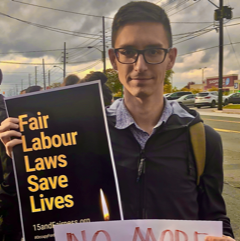
Erin Sobat
Law students wear many hats, and at Osgoode, many students also wear the hat of being community organizers. I had the honour of interviewing 12 JD students about their involvement in various social justice movements and community initiatives this past year. Here is an overview of their work.
Erin Sobat (2L) has interests in labour and employment, criminal, and human rights law. For eight months, he was a caseworker in the Workers’ Rights Division at Parkdale Community Legal Services (PCLS). Erin has also been involved in efforts to reverse last year’s $130 million provincial cut to legal aid funding and oppose the Ford government’s new legal aid legislation (found in Bill 161, the so-called Smarter and Stronger Justice Act).
Erin expressed the importance of resisting these funding cuts, explaining that the cost of legal services is “far beyond the reach of the average person.” He went on, “our existing laws do very little to protect members of low-income and marginalized communities, whether we’re talking about extremely lax eviction rules or weak government enforcement of employment standards. Our community legal aid clinics are one of the few publicly-funded systems that can tackle these issues together, both by providing individuals legal services and also by focusing on law reform and community organizing work to address the legal sources of inequality.”
For example, Erin explained, “clinics like [PCLS] try to organize tenants and workers to defend their rights collectively, since they recognize that the Landlord and Tenant Board or the Ministry of Labour are not actually going to do it for them. (This is especially true under the Ford government). The funding cuts and the proposed new legislation are trying to eliminate this kind of “systemic work.””
Erin conveyed a clear message: “in the short term, we need to reverse ALL the cuts to legal aid services and abandon the Conservative government’s short-sighted new legal aid legislation. Looking ahead, not only does the legal aid system need MORE funding, but we need to prevent the government’s push to limit legal clinics’ systemic advocacy work.”
He issued a call to take collective action in protecting publicly-funded services and pursuing social change. “The law tries to limit us to thinking about individual cases and solutions within existing structures. Law should be a tool in the fight for social change but never the only strategy. Writing to your MPP or voting in the next election is not necessarily enough to actually move a government. What we really need are collective solutions and new systems. I want to protect the legal aid system because I see it as an important site for strategic legal work that can support community mobilization and mass movements—not the other way around.”
